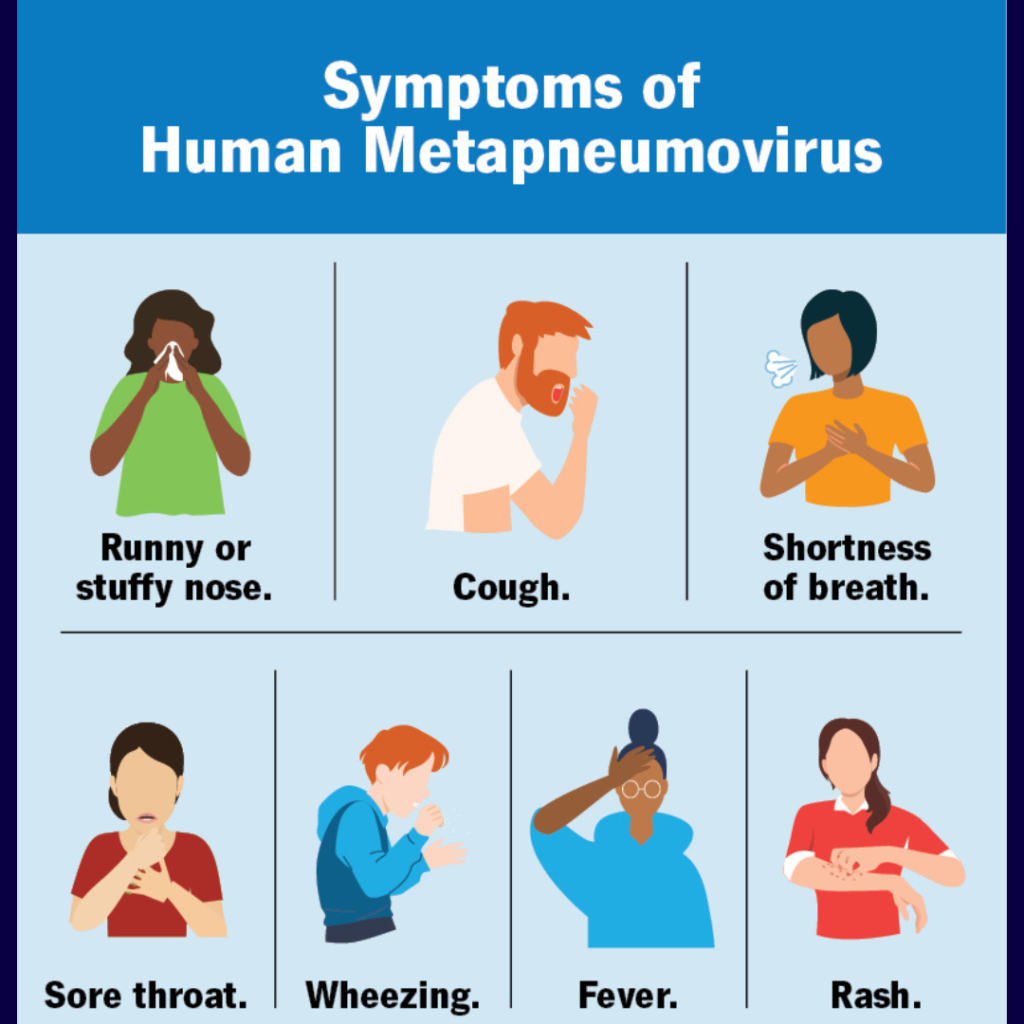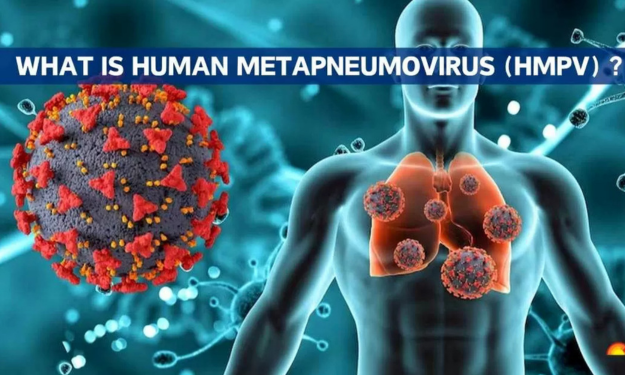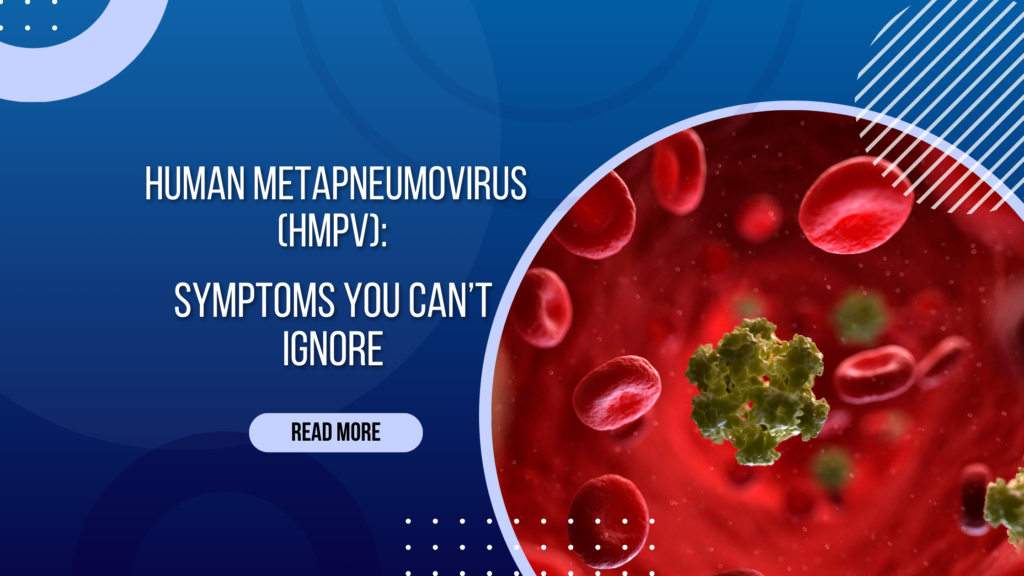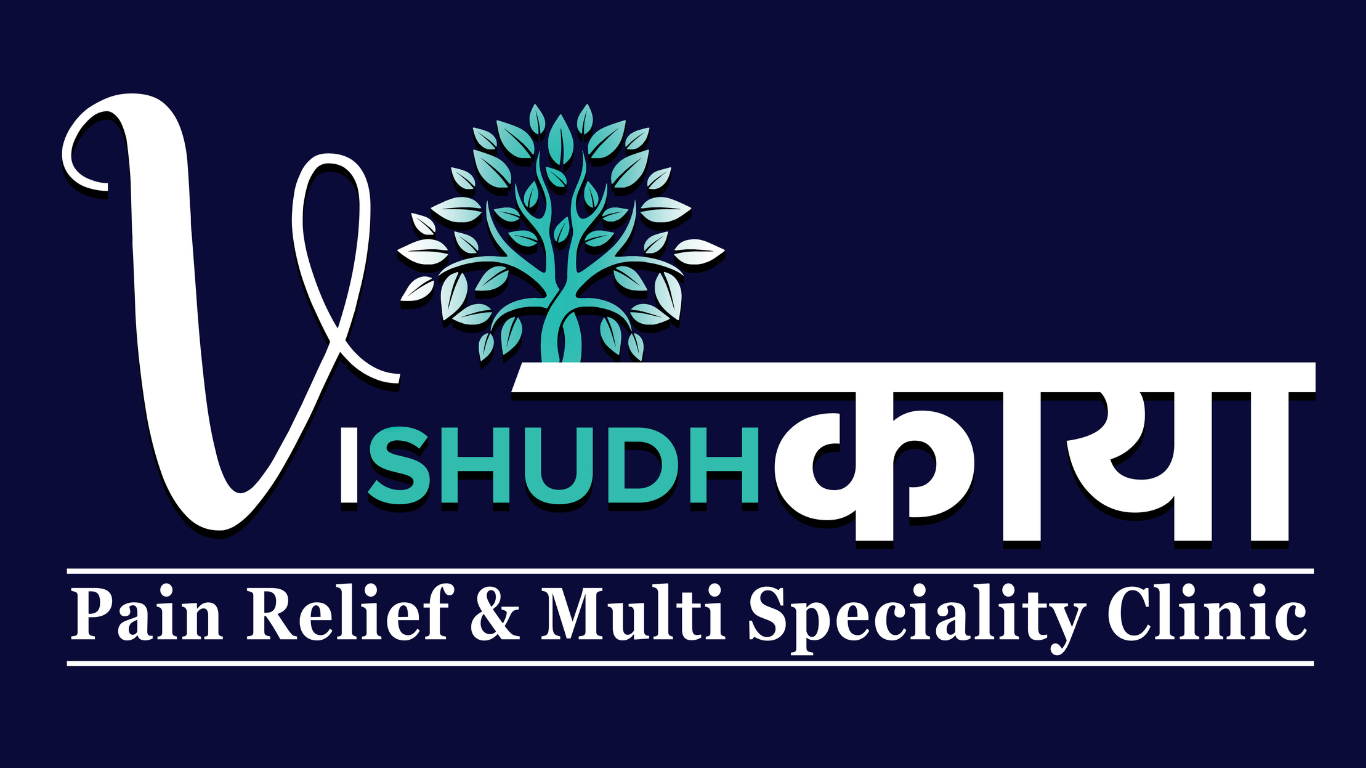Introduction:
Respiratory infections are a significant global health concern, affecting millions of people each year. While illnesses like the flu and COVID-19 receive widespread attention, other viral infections, such as Human Metapneumovirus (hMPV), remain largely underdiagnosed and overlooked. Despite its relative obscurity, hMPV is a highly contagious respiratory virus that can cause mild to severe infections, particularly in young children, elderly individuals, and those with weakened immune systems.
What is hMPV and Why is it Important?

hMPV was first discovered in 2001 and belongs to the Paramyxoviridae family, which includes other well-known respiratory viruses such as respiratory syncytial virus (RSV) and measles. Since its discovery, researchers have found that hMPV is responsible for a significant percentage of respiratory infections worldwide, often mimicking the symptoms of more commonly known viruses like influenza, RSV, and even COVID-19.
The virus spreads through respiratory droplets, meaning it can be transmitted by coughing, sneezing, or coming into contact with contaminated surfaces. Once inside the body, it targets the upper and lower respiratory tract, leading to a range of symptoms.
While many cases of hMPV result in mild, cold-like symptoms, severe infections can develop, particularly in individuals with compromised respiratory health. Those with conditions such as asthma, chronic obstructive pulmonary disease (COPD), or weakened immune systems are at an increased risk of complications, including bronchitis and pneumonia.
Why Early Detection is Crucial?
The early symptoms of hMPV can be easily mistaken for a common cold or flu, making it difficult to identify without proper testing.
These symptoms include:
- Cough (dry or productive)
- Nasal congestion and runny nose
- Fever (mild to moderate)
- Sore throat
- Shortness of breath or wheezing
- Fatigue and body aches
In healthy individuals, symptoms typically resolve within one to two weeks, but in vulnerable populations, they can escalate into more serious respiratory conditions. Hospitalization may be required in severe cases, particularly for infants, older adults, or those with preexisting lung diseases. Because hMPV symptoms resemble other viral infections, misdiagnosis is common, leading to delays in proper treatment. This makes early recognition and proactive care essential for managing the virus effectively and preventing unnecessary complications. This section explores hMPV’s symptoms, risks, prevention, and treatment options, highlighting how Vishudh Kaya Clinic promotes respiratory health.
How Does hMPV Spread?
hMPV is transmitted primarily through respiratory droplets, which are released when an infected person coughs, sneezes, or talks. These droplets can travel through the air and be inhaled by others nearby. Additionally, the virus can spread via direct contact with contaminated surfaces, such as door handles or shared objects. If a person touches a contaminated surface and then touches their eyes, nose, or mouth, they can introduce the virus into their body. Crowded places like schools, hospitals, and nursing homes are common areas for the virus to spread due to close contact.

Who is Most Affected by hMPV?
Certain groups are more susceptible to severe illness caused by hMPV, including:
- Young children, particularly those under 5, as their immune systems are still developing and may not fight off infections as effectively.
- Elderly adults, especially those over 65, whose immune systems tend to weaken with age, making them more vulnerable to infections.
- Immunocompromised individuals, including those with chronic conditions (such as asthma, COPD, or heart disease) or those undergoing treatments like chemotherapy or organ transplants, which suppress the immune system. These individuals are more likely to experience severe complications, such as pneumonia or bronchitis.
For these high-risk groups, hMPV can lead to serious health issues requiring hospitalization and intensive care. Prompt recognition and medical attention are crucial for preventing complications.
Recognizing the Symptoms of hMPV and Their Impact on Daily Life
Human Metapneumovirus (hMPV) is a respiratory virus that can affect individuals of all ages, with symptoms ranging from mild cold-like discomfort to severe respiratory distress. While many people recover without complications, high-risk groups—such as infants, older adults, and individuals with weakened immune systems—may experience more severe effects.
Here’s a breakdown of the symptoms and how they can interfere with daily activities:
- Mild Symptoms (Cold-Like Discomfort) – Many people with hMPV experience symptoms similar to the common cold, which can still disrupt daily routines:
- Runny nose, congestion, and sneezing → Persistent nasal congestion can make it difficult to breathe comfortably, affecting sleep quality and concentration at work or school. Frequent sneezing and nasal drainage may also cause discomfort in social and professional settings.
- Cough and sore throat → A dry or persistent cough can make conversations challenging, leading to throat irritation and discomfort when speaking for long periods. Eating and drinking may also become uncomfortable due to a sore throat.
- Impact on Daily Life
- Trouble sleeping due to congestion and coughing.
- Difficulty concentrating in meetings, classrooms, or while performing tasks.
- Avoiding social interactions to prevent spreading the virus or due to discomfort.
- Moderate Symptoms (Respiratory Distress) – As the virus progresses, some individuals experience symptoms that affect lung function, making even routine activities more difficult:
- Wheezing and shortness of breath → Reduced airflow can make it difficult to perform everyday tasks like climbing stairs, carrying groceries, or walking for extended periods.
- Low to moderate fever → Fever can cause chills, body aches, and fatigue, leading to reduced energy levels and difficulty focusing on daily responsibilities.
- Impact on Daily Life:
- Increased difficulty performing physical activities, such as household chores or commuting.
- The need for frequent breaks due to fatigue and shortness of breath.
- A reduced ability to engage in social or work-related commitments.
- Severe Symptoms (High-Risk Groups & Complications) – For high-risk individuals, hMPV can lead to severe respiratory complications requiring medical attention:
- Difficulty breathing → Struggling to breathe, even at rest, can cause distress and anxiety. In severe cases, oxygen levels may drop, requiring medical intervention.
- Bronchiolitis or pneumonia → These complications can result in a persistent cough, chest tightness, and a significant decline in lung function, making it difficult to perform even simple tasks like standing up or moving around the house.
- Impact on Daily Life:
- The inability to carry out self-care activities, requiring assistance from caregivers or hospitalization.
- Increased risk of complications leading to prolonged bed rest or the need for oxygen support.
- Complete disruption of normal routines, potentially requiring long-term medical treatment or recovery time.
Real-Life Scenarios Where Symptoms Interfere with Daily Activities
- Work and Productivity:
- A person with mild symptoms struggles to focus in meetings due to a persistent cough and congestion.
- Someone experiencing shortness of breath finds it exhausting to commute or stand for long hours at their job.
- Physical Activity:
- A parent with wheezing and fatigue finds it challenging to play with their children or complete household chores.
- An elderly individual with severe symptoms has difficulty walking even short distances without gasping for air.
- Social and Emotional Well-being:
- Persistent coughing and fatigue cause a person to withdraw from social events.
- Anxiety due to breathing difficulties leads to stress and difficulty sleeping.
Why Early Diagnosis is Vital?
Identifying Human Metapneumovirus (hMPV) in its early stages is essential for preventing severe complications, especially in high-risk individuals such as infants, the elderly, and those with weakened immune systems. Early detection not only helps in managing symptoms effectively but also reduces the risk of spreading the virus to vulnerable populations while promoting better respiratory health.
Preventing Severe Complications in High-Risk Groups
Although many people recover from hMPV without major issues, certain individuals are more prone to serious complications, including:
- Bronchiolitis or pneumonia, which may require hospitalization.
- Exacerbation of existing respiratory conditions, such as asthma or COPD.
- Severe breathing difficulties, necessitating medical intervention.
- Benefits of Early Diagnosis:
- Enables prompt treatment, lowering the risk of complications.
- Helps healthcare providers closely monitor high-risk patients.
- Allows for early supportive care, such as oxygen therapy or antiviral medications.
Limiting the Spread of Infection to Vulnerable Individuals
hMPV is highly contagious and spreads through respiratory droplets, making it easy to transmit in public places like schools, workplaces, and public transportation.
Why Early Detection Matters:
- Encourages infected individuals to take precautions, such as self-isolation.
- Reinforces preventive measures, including hand hygiene and mask usage.
- Helps caregivers and families protect those who are more susceptible to severe illness.
- Promoting Better Respiratory Health and Overall Well-Being
- Timely detection allows for better symptom management, reducing the likelihood of long-term complications and supporting overall health.
Advantages of Early Diagnosis:
- Reduces lung inflammation, preventing potential respiratory damage.
- Speeds up recovery, allowing individuals to return to their normal routine sooner.
Detecting hMPV early is crucial for safeguarding both individual and public health. Seeking medical attention at the first signs of infection can lead to faster recovery, reduced transmission, and a lower risk of serious complications.
Prevention and General Care Tips:

hMPV Prevention and Essential Care Strategies
Although there is no specific cure for Human Metapneumovirus (hMPV), adopting preventive habits and maintaining a healthy lifestyle can help lower the risk of infection and ease symptoms if they occur. Here are key measures to protect yourself and support respiratory well-being:
- Practice Good Hygiene to Minimize Infection Risk – Since hMPV spreads through respiratory droplets, following proper hygiene practices is essential to prevent its transmission.
- Key Hygiene Measures:
- Wash hands frequently with soap and water for at least 20 seconds, especially after sneezing, coughing, or touching shared surfaces.
- Avoid touching your face, particularly your eyes, nose, and mouth, to reduce the risk of infection.
- Cover your mouth and nose when coughing or sneezing by using a tissue or your elbow to prevent spreading germs.
- Disinfect frequently touched surfaces, such as phones, doorknobs, and keyboards, to eliminate potential contamination.
- Wear a mask in crowded areas, particularly if experiencing symptoms or during peak flu and virus seasons.
- Key Hygiene Measures:
- Strengthen Your Immune System for Added Protection – A healthy immune system can help fight infections more effectively and lessen the severity of illness.
- Ways to Boost Immunity:
- Eat a nutrient-dense diet rich in fruits, vegetables, whole grains, and lean proteins to provide essential vitamins and minerals.
- Stay well-hydrated by drinking plenty of water, which supports respiratory function.
- Engage in regular physical activity, such as walking, yoga, or light exercise, to improve circulation and overall health.
- Get enough sleep, as proper rest helps the body recover and enhances immune function.
- Manage stress levels through relaxation techniques like deep breathing, meditation, or engaging in enjoyable activities, as chronic stress can weaken immunity.
- Ways to Boost Immunity:
- Prioritize Regular Medical Checkups for Respiratory Health – Routine checkups help detect potential respiratory issues early, allowing for timely treatment and reducing the risk of complications.
- Why Regular Health Checkups Matter:
- Monitor lung health, especially for individuals with chronic respiratory conditions like asthma or COPD.
- Detect infections like hMPV early, preventing severe complications.
- Stay up to date with vaccinations, such as flu and pneumonia shots, which can lower the risk of co-infections.
- Receive professional medical advice on respiratory care, particularly for high-risk individuals.
- Why Regular Health Checkups Matter:
Preventing hMPV requires a combination of good hygiene, a strong immune system, and regular medical care. By taking these proactive steps, you can reduce the risk of infection and maintain better overall health.
Take Charge of Your Health at Vishudh Kaya Pain Relief and Multispeciality Clinic
At Vishudh Kaya Pain Relief and Multispeciality Clinic, we’re dedicated to helping you take control of your health. Our comprehensive health assessments address a variety of concerns, including respiratory conditions, musculoskeletal disorders, shoulder pain, HMPV (Human Metapneumovirus), and more. Our expert team provides personalized, effective treatments to meet your specific health needs.
We offer a range of therapies, including chiropractic care, osteopathy, physiotherapy (COP), homoeopathy, Ayurvedic treatments, and allopathic care—all designed to support your recovery and overall well-being.
Why Vishudh Kaya?
- Respiratory Care: Effective treatment options for respiratory conditions, including HMPV.
- Musculoskeletal Disorders: Targeted relief for pain and discomfort in muscles, joints, and bones.
- Shoulder Pain Solutions: Specialized care for shoulder, neck, and musculoskeletal pain.
- Allopathic Care: Incorporating conventional medicine for a well-rounded approach to healing.
- Personalized Treatment: Customized plans designed to meet your individual health needs.
Conclusion
Recognizing the symptoms of hMPV (Human Metapneumovirus) early is essential in managing the condition effectively. This respiratory virus can lead to severe complications, especially in vulnerable populations like children, the elderly, or individuals with weakened immune systems. Identifying the signs—such as cough, shortness of breath, wheezing, and fever—at an early stage can help prevent further complications and facilitate timely treatment, leading to a faster and smoother recovery. Delaying treatment or neglecting early symptoms may increase the risk of secondary infections or prolonged health issues.
Your health is your greatest asset—don’t delay care! The earlier you address health concerns, the better equipped you’ll be to manage them and maintain a high quality of life. Whether you’re dealing with respiratory issues like hMPV or physical pain such as a frozen shoulder, it’s crucial to seek professional care without hesitation.
Don’t wait for symptoms to worsen. Take control of your health today!
Vishudh Kaya Pain Relief and Multispeciality Clinic is here to provide you with personalized, holistic care. Our team specializes in offering comprehensive assessments and treatments that address a wide range of conditions, including respiratory concerns, musculoskeletal pain, and chronic issues.
“Whether you’re dealing with respiratory issues or physical pain like a frozen shoulder, Vishudh Kaya Pain Relief and Multispeciality Clinic is here to help. Schedule your consultation today!”
Take the First Step Toward Better Health Reach out today to schedule your consultation and start your path to better health.
📞 Call us at: +91-76781 35151
📍 Visit us at: #8566, Sector 125, Sunny Enclave, Kharar, Mohali, Punjab 140301
🌐 Book online at: https://vishudhkaya.com/
Don’t wait—empower yourself with Vishudh Kaya Pain Relief and Multispeciality Clinic!


